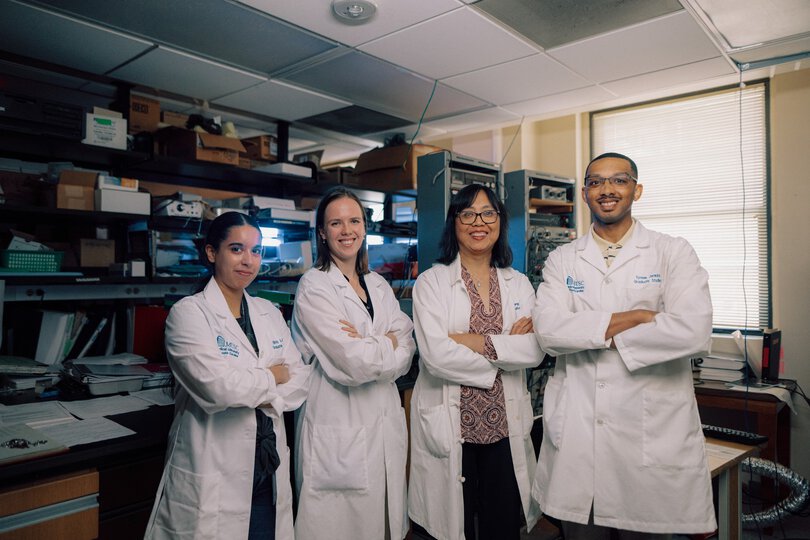Selected Recent Publications
- Cho JY, Rumschlag JA, Tsvetkov E, Proper DS, Lang H, Berto S, Assali A, Cowan CW (2024). MEF2C hypofunction in GABAergic cells alters sociability and prefrontal cortex inhibitory synaptic transmission in a sex-dependent manner. Biol Psychiatry Glob Open Sci. 4(2):100289. PMCID: PMC1088131.
- Lang H, Noble KV, Barth JL, Rumschlag JA, Jenkins TR, Storm SL, Eckert MA, Dubno JR, Schulte BA (2023). The stria vascularis in mice and humans is an early site of age-related cochlear degeneration, macrophage dysfunction, and inflammation. J Neurosci 43, 5057-5075. PMCID: PMC10324995.
- Brown LN, Barth JL, Jafri S, Rumschlag JA, Jenkins TR, Atkinson C, Lang H (2023). Complement factor B is essential for the proper function of the peripheral auditory system. Front Neurol 14:1214408. PMCID: PMC10408708.
- McChesney N, Barth JL, Rumschlag JR, Tan J, Harrington AJ, Noble KV, McClaskey CM, Elvis P, Vaena SG, Romeo MJ, Harris KC, Cowan CW, Lang H (2022). Peripheral auditory nerve impairment in a mouse model of syndromic autism. J Neurosci 42, 8002-8018 (Selected for cover photo). PMCID: PMC9617620.
- Rumschlag JA, McClaskey CM, Dias JW, Kerouac LB, Noble KV, Panganiban C, Lang H, Harris KC (2022). Age-related central gain with degraded neural synchrony in the auditory brainstem of mice and humans. Neurobiol Aging 115, 50-59. PMCID: PMC9153923.
- Panganiban CH, Barth JL, Tan J, Noble KV, McClaskey CM, Howard BA, Jafri SH, Dias JW, Harris KC, Lang H (2021). Two distinct types of nodes of Ranvier support auditory nerve function in the mouse cochlea. Glia 70, 768-791. PMCID: PMC8994501.
- Liu T, Li G, Noble KV, Li Yong, Barth JL, Schulte BA, Lang H (2019). Age-dependent alterations of Kir4.1 expression in neural crest-derived cells of the mouse and human cochlea. Neurobiol Aging 18, 80:210-222. PMCID: PMC6679794.
- Noble KV, Liu T, Matthews L, Schulte BA, Lang H (2019). Age-related alterations in resident immune cells of the human cochlea. Front Neurol 10, 895. PMCID: PMC6707808.
- Noble KV, Reyzer ML, Barth JL, McDonald H, Tuck M, Schey KL, Krug EL, Lang H (2018). Use of proteomic imaging coupled with transcriptomic analysis to identify biomolecules responsive to cochlear injury. Front Mol Neurosci 11,243. PMCID: PMC30065626.
- Panganiban CH, Barth JL, Darbelli L, Xing Y, Zhang J, Li H, Noble KV, Liu T, Brown LN, Schulte BA, Richard S, Lang H (2018). Noise-induced dysregulation of Quaking RNA binding proteins contributes to auditory nerve demyelination and hearing loss. J Neurosci 38, 2551-2568. PMCID: PMC5858596.
- Brown LN, Xing Y, Noble KV, Barth JL, Panganiban CH, Smythe NM, Bridges MC, Zhu J, Lang H (2017). Macrophage-mediated glial cell elimination in the postnatal mouse cochlea. Front Mol Neurosci10, 407. PMCID: PMC5770652.
- Lang H, Nishimoto E, Xing Y, Brown LN, Noble KV, Barth JL, LaRue AC, Ando K, Schulte BA (2016). Contributions of mouse and human hematopoietic cells to remodeling of the adult auditory nerve after neuron loss. Mol Ther 24, 2000-2011. PMCID: PMC5154482.
- Lang H, Xing Y, Brown LN, Samuvel DJ, Panganiban CH, Havens LT, Balasubramanian S, Wegner M, Krug EL, Barth JL (2015). Neural stem/progenitor cell properties of glial cells in the adult mouse auditory nerve. Sci Rep 5, 3383. PMCID: PMC4549618.
A List of Published Work in My Bibliography









